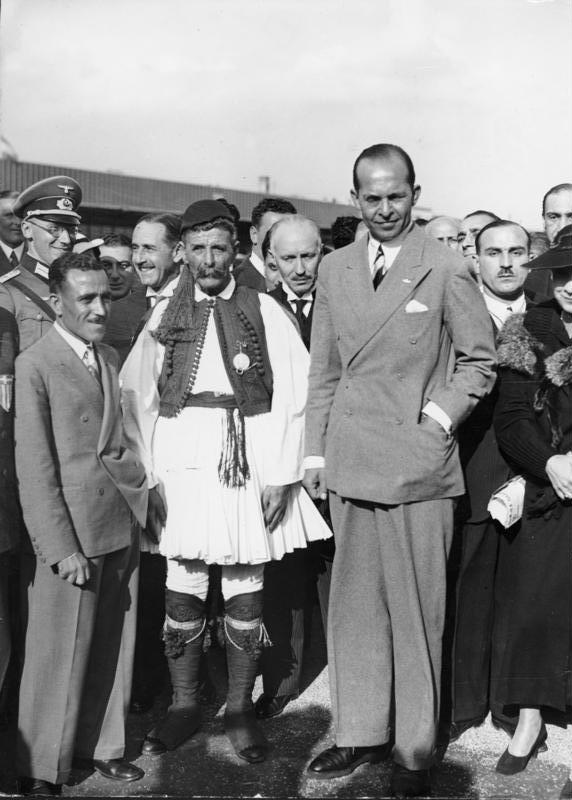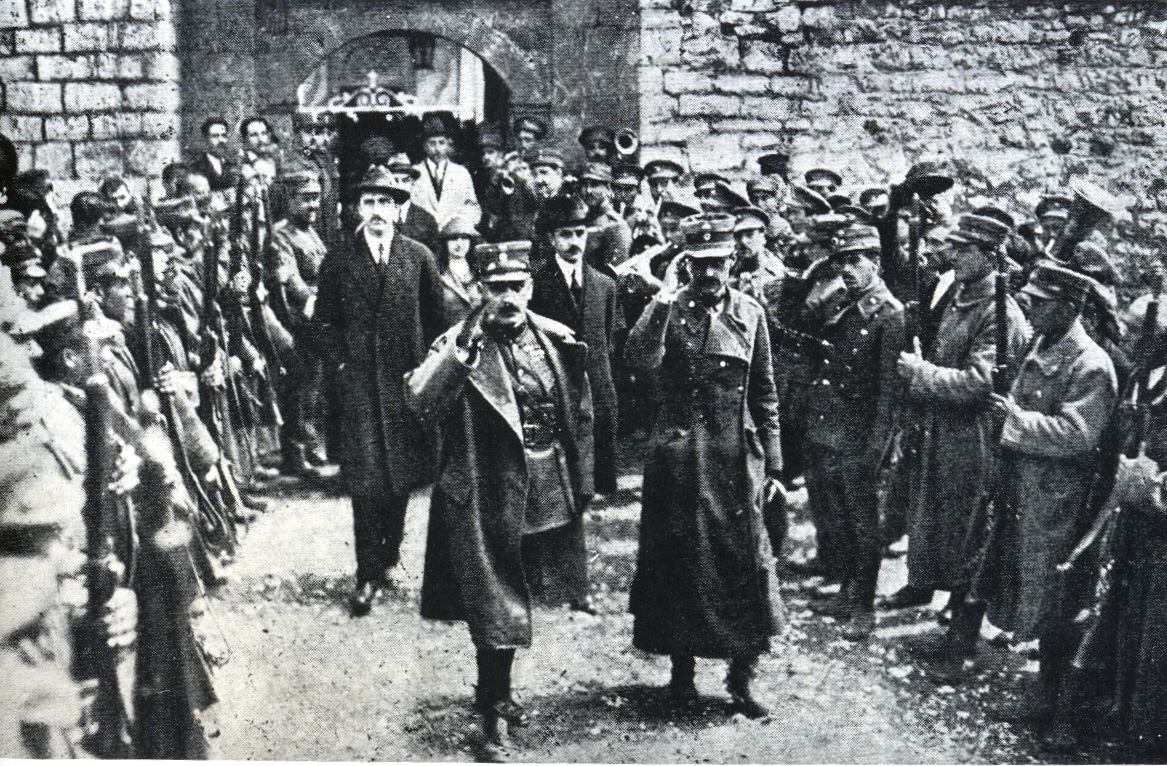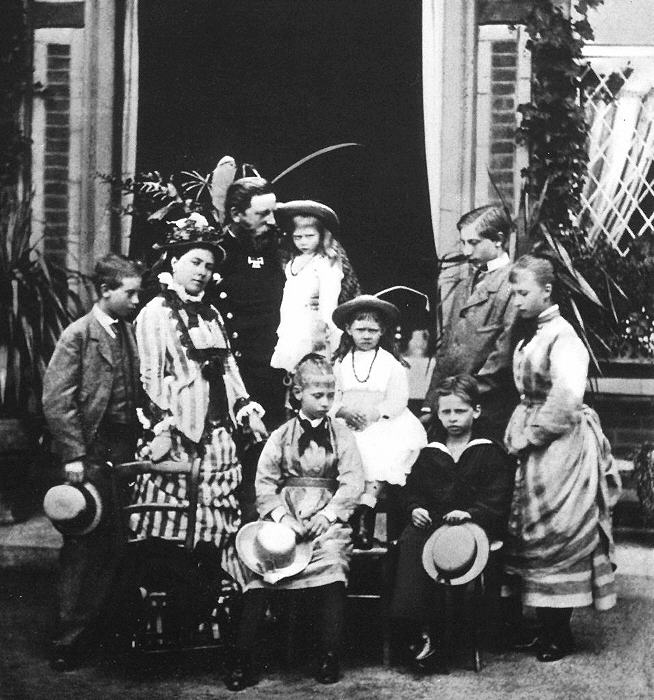|
Paul I Of Greece
Paul ( el, Παύλος, ''Pávlos''; 14 December 1901 – 6 March 1964) was King of Greece from 1 April 1947 until his death in 1964. He was succeeded by his son, Constantine II. Paul was first cousin to Prince Philip, Duke of Edinburgh and father-in-law to Juan Carlos I of Spain. Early life Paul was born on 14 December 1901 at the Tatoi Palace in Attica north of Athens, the third son of King Constantine I of Greece and his wife, Princess Sophia of Prussia. He trained as an army officer at the Royal Military College, Sandhurst and later at the Hellenic Military Academy in Kypseli, Athens. Paul was an army officer cadet in the Coldstream Guards and Lieutenant with the Evzones. From 1917 to 1920, Paul lived in exile with his father, Constantine I. From 1923 to 1935, he lived in exile again in England, this time with his brother, George II. He worked briefly in an aircraft factory under an alias, and through Viscount Tredegar met and befriended notorious literary muse De ... [...More Info...] [...Related Items...] OR: [Wikipedia] [Google] [Baidu] |
King Of The Hellenes
The Kingdom of Greece was ruled by the House of Wittelsbach between 1832 and 1862 and by the House of Glücksburg from 1863 to 1924, temporarily abolished during the Second Hellenic Republic, and from 1935 to 1973, when it was once more abolished and replaced by the Third Hellenic Republic. Only the first king, Otto, King of Greece, Otto, was actually styled ''Basileus#Modern Greece, King of Greece'' (). His successor, George I of Greece, George I, was styled ''King of the Hellenes'' (), as were all other modern Greek monarchs. Second Hellenic Republic, A republic was briefly established from 1924 to 1935. The restored monarchy was abolished weeks before the 1973 Greek republic referendum, referendum in 1973 conducted under the auspices of the then-ruling Regime of the Colonels, military regime, which confirmed the abolishment. It was re-confirmed by 1974 Greek republic referendum, a second referendum in 1974, after the metapolitefsi, restoration of democratic rule. House of Wi ... [...More Info...] [...Related Items...] OR: [Wikipedia] [Google] [Baidu] |
Georgios Papandreou
Georgios Papandreou ( ''Geórgios Papandréou''; 13 February 1888 – 1 November 1968) was a Greek politician, the founder of the Papandreou political dynasty. He served three terms as prime minister of Greece (1944–1945, 1963, 1964–1965). He was also deputy prime minister from 1950–1952, in the governments of Nikolaos Plastiras and Sofoklis Venizelos and served numerous times as a cabinet minister, starting in 1923, in a political career that spanned more than five decades. Early life Papandreou was born at Kalentzi, in the Achaea region of the northern Peloponnese. He was the son of Father Andreas Stavropoulos, an Orthodox archpriest (protopresvyteros). His last name is derived from his father's Christian name and the word ''papas'' "priest". He studied law in Athens and political science in Berlin. His political philosophy was heavily influenced by German social democracy. As a result, he was adamantly opposed to the monarchy and supported generous social policies, ... [...More Info...] [...Related Items...] OR: [Wikipedia] [Google] [Baidu] |
King Of Greece
The Kingdom of Greece was ruled by the House of Wittelsbach between 1832 and 1862 and by the House of Glücksburg from 1863 to 1924, temporarily abolished during the Second Hellenic Republic, and from 1935 to 1973, when it was once more abolished and replaced by the Third Hellenic Republic. Only the first king, Otto, King of Greece, Otto, was actually styled ''Basileus#Modern Greece, King of Greece'' (). His successor, George I of Greece, George I, was styled ''King of the Hellenes'' (), as were all other modern Greek monarchs. Second Hellenic Republic, A republic was briefly established from 1924 to 1935. The restored monarchy was abolished weeks before the 1973 Greek republic referendum, referendum in 1973 conducted under the auspices of the then-ruling Regime of the Colonels, military regime, which confirmed the abolishment. It was re-confirmed by 1974 Greek republic referendum, a second referendum in 1974, after the metapolitefsi, restoration of democratic rule. House of Wi ... [...More Info...] [...Related Items...] OR: [Wikipedia] [Google] [Baidu] |
Greece
Greece,, or , romanized: ', officially the Hellenic Republic, is a country in Southeast Europe. It is situated on the southern tip of the Balkans, and is located at the crossroads of Europe, Asia, and Africa. Greece shares land borders with Albania to the northwest, North Macedonia and Bulgaria to the north, and Turkey to the northeast. The Aegean Sea lies to the east of the Geography of Greece, mainland, the Ionian Sea to the west, and the Sea of Crete and the Mediterranean Sea to the south. Greece has the longest coastline on the Mediterranean Basin, featuring List of islands of Greece, thousands of islands. The country consists of nine Geographic regions of Greece, traditional geographic regions, and has a population of approximately 10.4 million. Athens is the nation's capital and List of cities and towns in Greece, largest city, followed by Thessaloniki and Patras. Greece is considered the cradle of Western culture, Western civilization, being the birthplace of Athenian ... [...More Info...] [...Related Items...] OR: [Wikipedia] [Google] [Baidu] |
Athens, Greece
Athens ( ; el, Αθήνα, Athína ; grc, Ἀθῆναι, Athênai (pl.) ) is both the capital and largest city of Greece. With a population close to four million, it is also the seventh largest city in the European Union. Athens dominates and is the capital of the Attica region and is one of the world's oldest cities, with its recorded history spanning over 3,400 years and its earliest human presence beginning somewhere between the 11th and 7th millennia BC. Classical Athens was a powerful city-state. It was a centre for the arts, learning and philosophy, and the home of Plato's Academy and Aristotle's Lyceum. It is widely referred to as the cradle of Western civilization and the birthplace of democracy, largely because of its cultural and political influence on the European continent—particularly Ancient Rome. In modern times, Athens is a large cosmopolitan metropolis and central to economic, financial, industrial, maritime, political and cultural life in Greece. In 2 ... [...More Info...] [...Related Items...] OR: [Wikipedia] [Google] [Baidu] |
Kingdom Of Greece
The Kingdom of Greece ( grc, label=Greek, Βασίλειον τῆς Ἑλλάδος ) was established in 1832 and was the successor state to the First Hellenic Republic. It was internationally recognised by the Treaty of Constantinople, where Greece also secured its full independence from the Ottoman Empire after nearly four centuries. The Kingdom of Greece was dissolved in 1924 and the Second Hellenic Republic was established following Greece's defeat by Turkey in the Asia Minor Campaign. A military ''coup d'état'' restored the monarchy in 1935 and Greece became a Kingdom again until 1973. The Kingdom was finally dissolved in the aftermath of a seven-year military dictatorship (1967–1974) and the Third Hellenic Republic was established following a referendum held in 1974. Background The Greek-speaking Eastern Roman Empire, also known as Byzantine Empire, which ruled most of the Eastern Mediterranean region for over 1100 years, had been fatally weakened since the sackin ... [...More Info...] [...Related Items...] OR: [Wikipedia] [Google] [Baidu] |
Athens
Athens ( ; el, Αθήνα, Athína ; grc, Ἀθῆναι, Athênai (pl.) ) is both the capital and largest city of Greece. With a population close to four million, it is also the seventh largest city in the European Union. Athens dominates and is the capital of the Attica region and is one of the world's oldest cities, with its recorded history spanning over 3,400 years and its earliest human presence beginning somewhere between the 11th and 7th millennia BC. Classical Athens was a powerful city-state. It was a centre for the arts, learning and philosophy, and the home of Plato's Academy and Aristotle's Lyceum. It is widely referred to as the cradle of Western civilization and the birthplace of democracy, largely because of its cultural and political influence on the European continent—particularly Ancient Rome. In modern times, Athens is a large cosmopolitan metropolis and central to economic, financial, industrial, maritime, political and cultural life in Gre ... [...More Info...] [...Related Items...] OR: [Wikipedia] [Google] [Baidu] |
Tatoi Palace
Tatoi ( el, Τατόι, ) was the summer palace and estate of the former Greek royal family. The area is a densely wooded southeast-facing slope of Mount Parnitha, and its ancient and current official name is Dekeleia. It is located from the city centre of Athens. Development of the estate and ownership disputes King George I of the Hellenes obtained the estate during the 1880s, purchasing it with private funds he had brought from Denmark. In 1916, during the First World War, the house was burned down. During the Republican regime in the 1920s, most of the estate was confiscated from its owners, but in 1936 it was returned to King George II of the Hellenes following the monarchy's restoration. During the Second World War, when the King was in exile and Greeks suffered considerable hardships under German occupation, the woods at Tatoi were chopped down for fuel and corpses were buried in shallow graves. King George II regained possession of the estate in 1946. It pas ... [...More Info...] [...Related Items...] OR: [Wikipedia] [Google] [Baidu] |
Sophia Of Prussia
Sophia of Prussia (Sophie Dorothea Ulrike Alice, el, Σοφία; 14 June 1870 – 13 January 1932) was Queen consort of the Hellenes from 1913–1917, and also from 1920–1922. A member of the House of Hohenzollern and child of Frederick III, German Emperor, Sophia received a liberal and Anglophile education, under the supervision of her mother Victoria, Princess Royal. In 1889, less than a year after the death of her father, she married her third cousin Constantine, heir apparent to the Greek throne. After a difficult period of adaptation in her new country, Sophia gave birth to six children and became involved in the assistance to the poor, following in the footsteps of her mother-in-law, Queen Olga. However, it was during the wars which Greece faced during the end of the 19th and the beginning of the 20th century that Sophia showed the most social activity: she founded field hospitals, oversaw the training of Greek nurses, and treated wounded soldiers. However, Sophia was h ... [...More Info...] [...Related Items...] OR: [Wikipedia] [Google] [Baidu] |
Constantine I Of Greece
Constantine I ( el, Κωνσταντίνος Αʹ, ''Konstantínos I''; – 11 January 1923) was King of Greece from 18 March 1913 to 11 June 1917 and from 19 December 1920 to 27 September 1922. He was commander-in-chief of the Hellenic Army during the unsuccessful Greco-Turkish War of 1897 and led the Greek forces during the successful Balkan Wars of 1912–1913, in which Greece expanded to include Thessaloniki, doubling in area and population. He succeeded to the throne of Greece on 18 March 1913, following his father's assassination. Constantine’s disagreement with Eleftherios Venizelos over whether Greece should enter World War I led to the National Schism. He forced Venizelos to resign twice, but in 1917 he left Greece, after threats by the Entente forces to bombard Athens; his second son, Alexander, became king. After Alexander's death, Venizelos' defeat in the 1920 legislative elections, and a plebiscite in favor of his return, Constantine was reinstated. He abd ... [...More Info...] [...Related Items...] OR: [Wikipedia] [Google] [Baidu] |
House Of Schleswig-Holstein-Sonderburg-Glücksburg
A house is a single-unit residential building. It may range in complexity from a rudimentary hut to a complex structure of wood, masonry, concrete or other material, outfitted with plumbing, electrical, and heating, ventilation, and air conditioning systems.Schoenauer, Norbert (2000). ''6,000 Years of Housing'' (rev. ed.) (New York: W.W. Norton & Company). Houses use a range of different roofing systems to keep precipitation such as rain from getting into the dwelling space. Houses may have doors or lock (security device), locks to secure the dwelling space and protect its inhabitants and contents from burglars or other trespassers. Most conventional modern houses in Western cultures will contain one or more bedrooms and bathrooms, a kitchen or cooking area, and a living room. A house may have a separate dining room, or the eating area may be integrated into another room. Some large houses in North America have a recreation room. In traditional agriculture-oriented societies, Li ... [...More Info...] [...Related Items...] OR: [Wikipedia] [Google] [Baidu] |
Princess Irene Of Greece And Denmark
Princess Irene of Greece and Denmark, ( el, Ειρήνη; born 11 May 1942) is the youngest child and second daughter of Paul of Greece and his wife Queen Frederica. She is the younger sister of Queen Sofía of Spain and of the deposed Constantine II of Greece, Prince of Denmark and maternal aunt of Felipe VI of Spain. Biography Irene was born in Cape Town, South Africa, where her parents were living in exile, on 11 May 1942. She was christened at her parent's Claremont home by the Metropolitan of the Holy Archdiocese of Good Hope. She had ten godparents including General Jan Smuts, Princess Katherine of Greece and Denmark (her paternal aunt), the King of Hellenes (her paternal uncle), Queen Mary of the United Kingdom, and the Duchess of Kent (her paternal first cousin once removed). She was a pupil of concert pianist Gina Bachauer and, for a while, she was a professional concert pianist herself. Irene was courted by Prince Michel of Orléans, a younger son of the Orlé ... [...More Info...] [...Related Items...] OR: [Wikipedia] [Google] [Baidu] |





